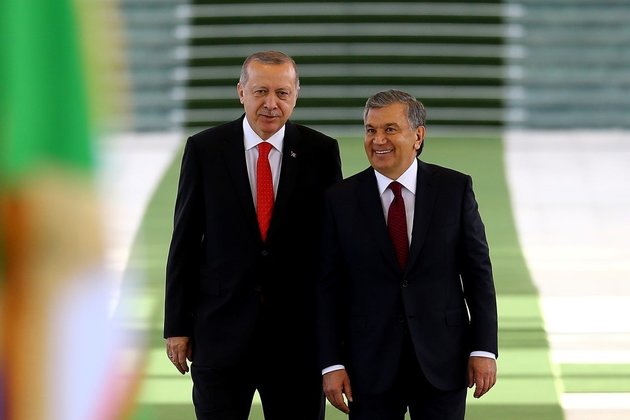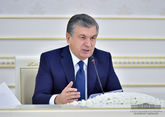President of Uzbekistan Shavkat Mirziyoyev will start a two-day state visit to Turkey on February 19. In talks with Turkish leader Recep Tayyip Erdogan, he will discuss economic issues, as well as take part in a meeting of the bilateral Strategic Cooperation Council and the opening ceremony of the Presidential Library complex of Turkey.
According to Tashkent officials, Uzbekistan-Turkey relations are on the rise. The relations between the two countries were reset in November 2016, when Erdogan paid his first visit to Tashkent. During this period, a visa-free regime was established between the states, more than 20 documents were signed to develop cooperation in economy, transport and logistics, trade, tourism, healthcare, training, defense and other areas. The President of Uzbekistan also visited Ankara for the first visit in 18 years. The agreements and contracts worth more than $3.5 billion were signed.
In late April 2018, during Erdogan’s visit to Tashkent, the parties signed agreements worth about $3 billion, as well as agreed to bring trade turnover to $5 billion in the medium term. In addition, last year Mirziyoyev for the first time participated in the Turkic Council Summit, after Uzbekistan became its member in September 2019. The Uzbek leader then noted that "Uzbekistan'sentry into the organization is a reflection of the natural historical process and fully meets the fundamental interests of our people."
Turkey has recently become one of Uzbekistan's largest trade and economic partners. For Tashkent, it is fundamentally important to increase the country's economic opportunities, including through the arrival of foreign investors. Turkish businessmen, as the experience of the last three years shows, have actively entered the Uzbek market. If in 2017-2019, 750 enterprises created with the participation of Turkish partners were registered in Uzbekistan, today their number has exceeded 1,140.
Bilateral trade is growing as well. In 2017, the volume of bilateral trade amounted to $1.5 billion, but in 2018 this figure increased to $2.2 billion. And last year, the volume of trade between the two countries reached $2.5 billion. Turkish Ambassador to Uzbekistan Mehmet Sureyya Er noted that radical transformations have been carried out in the republic in recent years, and Turkey intends to contribute to these reforms.
In particular, Tashkent and Ankara are discussing the opening of a branch of the Turkish special industrial zone 'Gebze'. Recently, Turkish Vice President Fuat Oktay held talks with the Minister of Investment and Foreign Trade of Uzbekistan Sardor Umurzakov on issues of systemic interaction in the field of transport and freight transportation, expanding cooperation in the framework of technical assistance programs and concessional lending by the Turkish government. According to the Uzbek agency, they also studied the issues of accelerating preparations for the signing of the Agreement on preferential trade between the Republic of Uzbekistan and the Republic of Turkey, expanding the list of commodity items proposed for inclusion in this agreement, and agreed on the procedure for its practical application. "It is expected that these measures will greatly contribute to the fulfillment of the instructions of the Presidents of the two countries to bring trade between Turkey and Uzbekistan to $5 billion," the Uzbek ministry said in a statement.
The cooperation between the railway departments of the two countries is discussed. Uzbek Railways and Turkish Railways intend to develop transportation by the Baku-Tbilisi-Kars railway, as well as launch container trains.
"Uzbekistan continues to diversify its foreign policy. Last year, the number of its trading partners increased to 178. This is quite large and far from final. The republic's main foreign trade partners are China (18.1% of total trade), Russia (15.7% ), Kazakhstan (8%), South Korea (6.5%) and Turkey (6%). Uzbekistan has a favourable trade balance only with five states, including Afghanistan, Kyrgyzstan and Tajikistan. Its trade balance with others is negative," head of the Center for Central Asia and Caucasus Studies at the Russian Academy of Sciences Stanislav Pritchin told Vestnik Kavkaza.
As for Uzbekistan's entry into the Turkic Council, this is an additional platform for cultural and educational interaction. “Yet, Turkey's influence in the educational sphere in Central Asia has noticeably decreased after the closure of Gulen’s educational institutions. Turkey hasn’t offered anything yet in exchange,” the expert noted. Pritchin connects Turkey's passivity with Ankara's new foreign policy priorities - the Middle East, Syria, Libya.
According to the press service of the President of Uzbekistan, Shavkat Miziyev will deliver a welcoming speech at the inauguration ceremony of the Turkish Presidential Library. That will confirm the spiritual bonds linking the peoples of the two countries, their leaders' attention to the development of science and education, which are brought to the level of state policy.
The library was built on the territory of the Turkish Presidential complex. It is a peculiar building, designed with Ottoman and Seljuk architectural synthesis. The total area of the 11-story building is 120 thousand square meters. Along with works related to Turkish culture, science and art, the library features unique editions, ancient manuscripts and modern scientific books on the development of world civilization.








